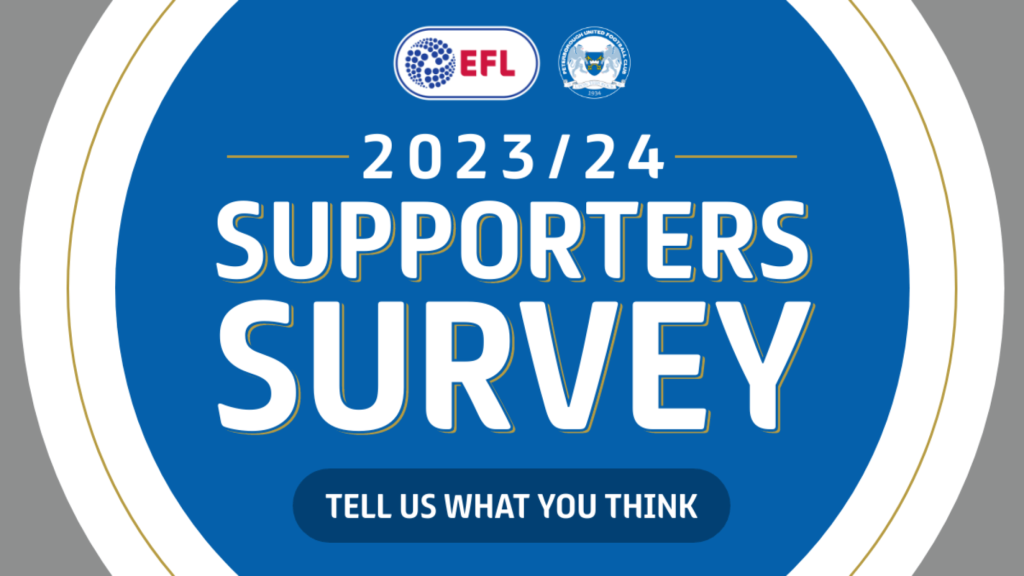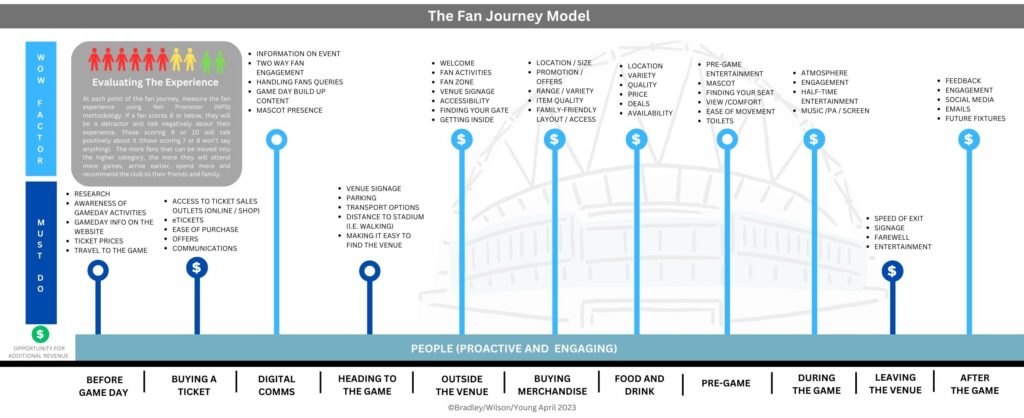© The Fan Experience Company 2023

The Fans Journey - Part 12: After The Game
Many years ago, research identified that the simple experience of receiving a request for feedback from a service provider improves the recipient’s perceptions of that organisation. Yes, that’s right. You may not feel any particular strong emotion towards the service provider until the point when they ask you for your opinion. Then you warm to them.
Football’s tendency to keep fans at arm’s length has led to a love / hate relationship with supporters: they can love their team but hate their club. Over the last few decades, this unconscious scorn has softened into a begrudging acceptance that talking is good but according to the data from more than 3,600 fan experience assessments that we have undertaken, only a tiny percentage of fans are likely to get a request for feedback after attending a game.
It’s not a costly exercise. As Fanbase CEO, Alasdair Crawley explains in the podcast that this blog complements, there are plentiful low- or no-cost solutions out there. Most clubs have an understanding of ‘football relationship marketing’: they mostly know who their fans are, they just don’t care much what they think about the match day experience. Or at least, that’s got to be the obvious conclusion when (1) it’s easy to do, (2) you only need to ask a few short questions, (3) it doesn’t cost much and (4) fans will be pleased to hear from the club.

Mark Bradley
@fanexperienceco
Mark founded the Fan Experience Company in 2005 to build attendance growth and community engagement on the basis of improving fan experiences. He recently created FC Barcelona’s Barça Innovation Hub’s first fan engagement study certificate. The Fan Experience Company has undertaken more than 3,500 fan experience assessments in many countries for clients as diverse as The Danish Superliga, The EFL, The WSL / WC, United Rugby and Premiership Rugby.

Geoff Wilson
@fanexperienceco
Geoff runs his own Sports Consultancy, working with clients such as FIFA, UEFA, AFC and FIBA across the world. He is also on the board of Tourism Northern Ireland. You can follow Geoff on twitter @geoffwnjwilson connect on Linkedin at linkedin.com/in/geoffwnjwilson

Darren Young
@fanexperienceco
Darren joined the Fan Experience Company in 2017. He has an MBA with a background in customer service excellence having worked as a consultant in that field for a number of years. As well as being responsible for all of the assessment summary reports that are produced each season, he has also worked with a number of clubs on an individual basis, including Lincoln City, Walsall, Grimsby Town, Nottingham Forest and OH Leuven on projects ranging from staff development to supporter feedback surveys.
Perhaps it’s complacency. ‘If they had an issue, they would tell us’ may be the attitude. ‘They keep coming anyway’. Not true. Any club worth their salt will tell you that when you survey non-renewing season ticket holders (apparently the most loyal of them all) the biggest reasons for stepping away are usually within the gift of the club to fix. ‘I don’t like the people sitting next to me’, ‘My work patterns have changed’, ‘I’m worried about the cost’ and ‘we get rained on in that seat’.
For women’s football, where the relative newness of the sport means that tickets have to be marketed, rather than being simply manufactured to meet an existing demand, post-game feedback is even more vital.
Currently, we believe that the average fan of women’s football only attends 1 or 2 games a season. With attendance being the bedrock of habit, we must stretch that number into a sequence of visits so that the fan gets the bug and attends regularly. And yet, with so few women’s clubs seeking post-match feedback, it looks like the sport is missing a massive opportunity to demonstrate just how different it is from the men’s game.
Perhaps the issue is education. After all, a lot of people involved in growing football club attendances are professional marketers. They understand how to promote the club, celebrate its differences and present the match day as an attractive proposition. The problem is, if it isn’t, all you can do is try to market the next game better. The point is that we need a balance between both marketing and fan experience and, in the short term, one of the best ways to achieve that equilibrium would be to start asking people how they feel about their experiences.
So what are key principles of post-game feedback?
First of all, don’t delay. Recalling all of your match day experiences several days after the game isn’t easy. We’re professional fan experience assessors and we have to make copious notes and begin the writing process within hours of the match to serve our clients best, so the typical fan might not recall everything that happened if you leave it too late.
Don’t over-complicate things either. In brief, you want to know how the fan rated the experience, why the fan gave that rating and what they’d like the club to do to improve the experience. Another reason for keeping it brief-ish is to ensure that you don’t get a nasty case of survey fatigue. It’s important that fans feel inclined to keep giving feedback so when you do it often, not only do they know that you’re serious about it, the continual feedback accumulated will help clubs better understand the impact on match day experience perceptions of things like team performance, weather, day of the week and kick off time.
The truth is that many clubs make assumptions about these variables. If the team isn’t playing well, people are more likely to complain. True, but it would be risky to base your wider engagement strategy on shaky assumptions like that (my colleague calculated that his team won 25% of homes games in the last five years). It’s more likely the case that a great run of performances might actually prevent fans from identifying a general barrier to engagement.
Of the clubs who do seek post-match feedback, only a smaller percentage still routinely communicate what the fan base is saying about their experiences. Fail to do that and people will fail to complete the surveys, as they won’t believe you’re taking their comments seriously. Ask fans for their opinion; regularly communicate the key messages; update the supporter community regularly on what you’re doing with the feedback and how you’re improving the experience and, finally, thank everyone for taking the time to share their thoughts.
So after the game, thank fans for their attendance and support, tell them when the next game(s) is taking place but above all, do what I suggest here and ask for their views. You might be surprised just how useful they are.
Most of the barriers to effective supporter engagement in football are either cultural or educational. Making feedback a priority in 2024 will be an excellent first step down the road to making fans feel valued and unleashing all of the associated benefits in terms of advocacy, retention and revenue.
Thanks to Geoff Wilson for his valuable input and vast experience. Thanks to all of our guests along the way too. Most of all, thank you to everyone who has downloaded or streamed an episode or two. We’re all very grateful.
And incidentally, what did you think? Have you got any feedback? Email [email protected] and tell us how we can do things better in Season 4.


If you’d like help with this or other game day touch points, then make sure to listen in to The Fan Experience Experience podcast (on Spotify, Apple Podcasts and via Buzzsprout); to visit www.fanexperienceco.com or to email us via [email protected].
Mark Bradley, Geoff Wilson and Darren Young assessed the fan experience at eight matches at the 2022 World Cup in Qatar. Click here to read more about what they found there.
